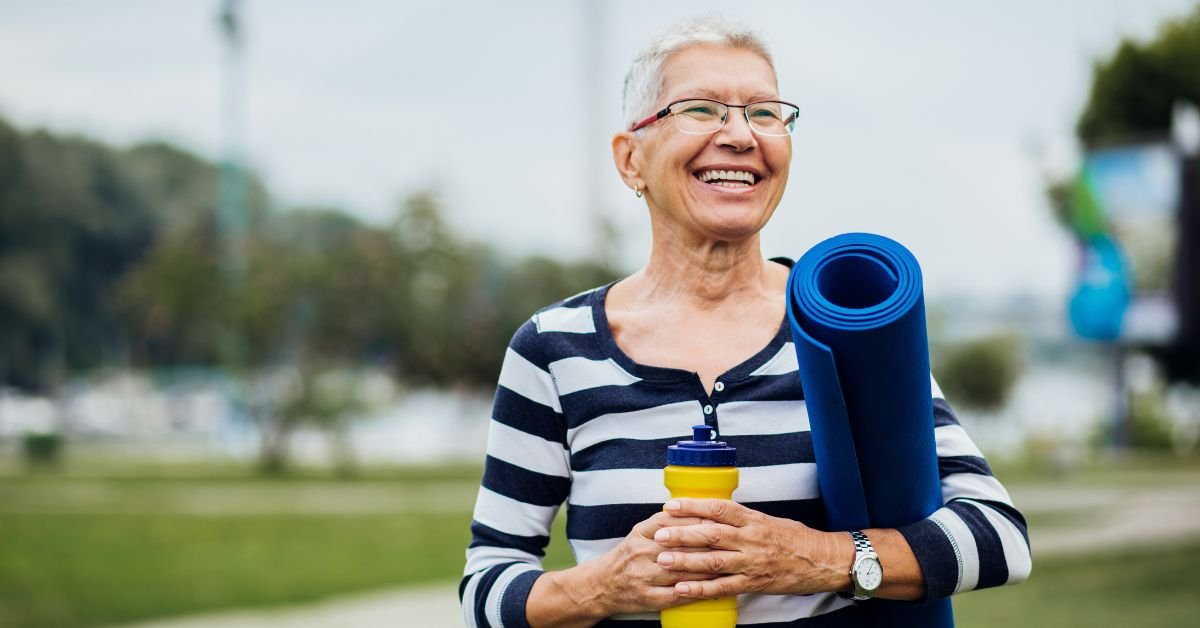The menopause has been a taboo subject for far too long. Finally this is changing, as more public health campaigns and messages are being shared in order to empower women (and men) to understand more about what happens during the menopause, the vast changes the female body goes through during this time, and the important recommended lifestyle changes.
What we’ll cover:
What is the menopause?
The menopause is a natural transition, it refers to the time in a woman’s life when the menstrual periods finish, and their ovaries no longer have a reproductive function. The menopause is diagnosed when a women has not had a period for 12 months. The average age for menopause in the UK is 51.
The perimenopause refers to the time from the start of menopausal symptoms until the periods stop. The average age of onset is 45. Periods can fluctuate for many months or years during this time. Postmenopause refers to the time after a woman hasn’t had a period for 12 months. Early menopause refers to periods ending before the age of 45. A number of surgeries and cancer treatments can lead to early menopause.
What are the symptoms?
Menopause symptoms are vast, wide and can be fluctuating. Most women experience symptoms, however they vary widely between person to person, and can vary widely for an individual woman at different times.
Most people are aware of the ‘typical’ menopausal symptoms discussed such as hot flushes, brain fog, and weight gain. But there are many more! Check out this poster from the Pausivity campaign:

The vast majority of symptoms are due to loss of hormonal oestrogen being produced by the ovaries. We have oestrogen receptors all over our bodies!
Oestrogen affects our joints, cartilage, muscle, bone density, reproductive and urinary tract, heart and blood vessels, skin, hair, mucous membranes and the brain.
Specific impacts of oestrogen across the body:
- Vital for bone density – 1 in 2 postmenopausal women have osteoporosis.
- Affects muscle mass, strength and power – these are all reduced post menopause due to a combination of muscle atrophy, conversion of muscle fiber types to more slower fibers and fatty infiltration in muscles.
- Plays a role in healing and inflammation.
- Joint pain is a common complaint in menopausal women, and is more common in women who have early menopause.
- Important for brain health– there are increased rates of cognitive decline and risk of dementia in menopausal women.
- Plays a protective role in the cardiovascular system by preventing fat build up- low oestrogen is associated with cardiovascular disease, blood pressure and cholesterol increases and weight gain.
- Mental health– anxiety, stress and depression are commonly experienced symptoms during the menopause.
- Genitourinary symptoms– including vaginal dryness, urgency and incontinence.
It’s really important for all women to be aware of these wide ranging symptoms. More knowledge about symptoms means women are more likely to speak to health professionals, friends, family and work colleagues about the symptoms they are experiencing.
How is menopause diagnosed?
In women over the age of 45 the diagnosis is made on symptoms and period pattern. In younger women blood tests are often done to confirm diagnosis and investigate potential causes. In women over the age of 45 blood tests often aren’t useful because hormone levels are constantly fluctuating.
How can the menopause be managed?
Lifestyle changes are key! Including maintaining a healthy weight, exercising regularly, reducing alcohol, coffee, stopping smoking can all have a huge effect on symptoms!
Exercise should include aerobic and resistance based exercises to counteract the negative impact on the cardiovascular system, and the muscles and bones.
In another post, we went into further detail specifically on the effect of the menopause on our muscles and bones, and how this can be managed. It’s worth a read if you’re interested in learning more about protecting your muscles and bones during the menopause.
Specific dietary recommendations include increasing protein, ensuring enough vitamin D, calcium, and reduced foods with high sugar or fat.
Activities including relaxation, mindfulness, meditation are also recommended; in some women who are suffering from more severe anxiety or depression cognitive behavioural therapy can be extremely helpful.
Hormone replacement therapy (HRT) is an option which should be offered and explored with all women who are interested. There are different options including tablets, patches, skin gels, nasal sprays and vaginal rings. The aim is to replace the oestrogen the ovaries are no longer producing. Some are combined with progesterone, and some also include testosterone.
HRT can be extremely effective in many women, in helping to counteract the negative effect on muscle mass and strength loss, improving cardiovascular health, reducing symptoms of hot flushes, and reducing osteoporosis risk. HRT previously had very negative connotations based on a study from 2002 which suggested an increased risk of breast cancer and heart disease. However more recent research has counteracted this.
See the below infographic from the Women’s Health Concerns group:

This infographic shows that the average risk of breast cancer in women is 23 out of 1000. HRT increases this risk by 4. Whereas much bigger risk factors include being overweight or obese (increasing risk by 24), drinking 2 or more units of alcohol a day (increasing risk by 5). Exercising more than 2.5 hours a week had a protective effect- decreasing risk by 7 fewer cases.
The options for hormone replacement therapy should be explored with your doctor.
How can I get more information or support about the menopause?
Fortunately there are now loads of options for more info and support. Including:
How does increased knowledge help?
In all aspects of life, knowledge is power. Scientific and medical research has traditionally been governed by men, for men. Medical issues predominantly affecting women have lagged behind. We need to change this. It’s vitally important that women are more informed about these natural and inevitable changes that will occur during the menopause.
We need to know the symptoms to look out for; the lifestyle and exercise changes that are vital to help symptoms, and protect against the negative effects of the loss of oestrogen; as well as being aware of the potential hormonal replacement options available.
Ultimately the more conversations we have, the more empowered women are, the better the experience will be for all women.


